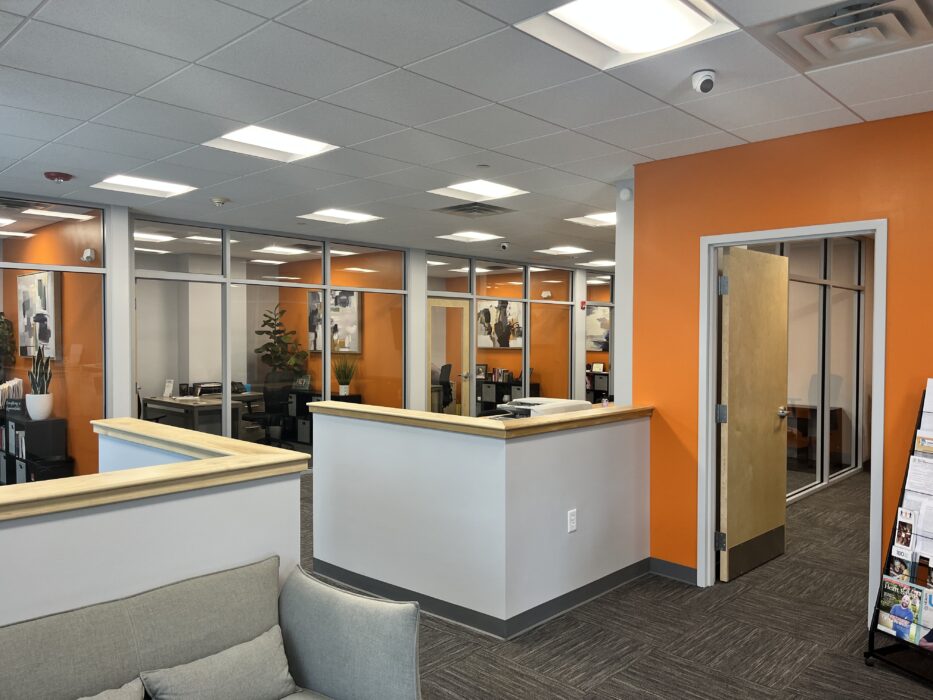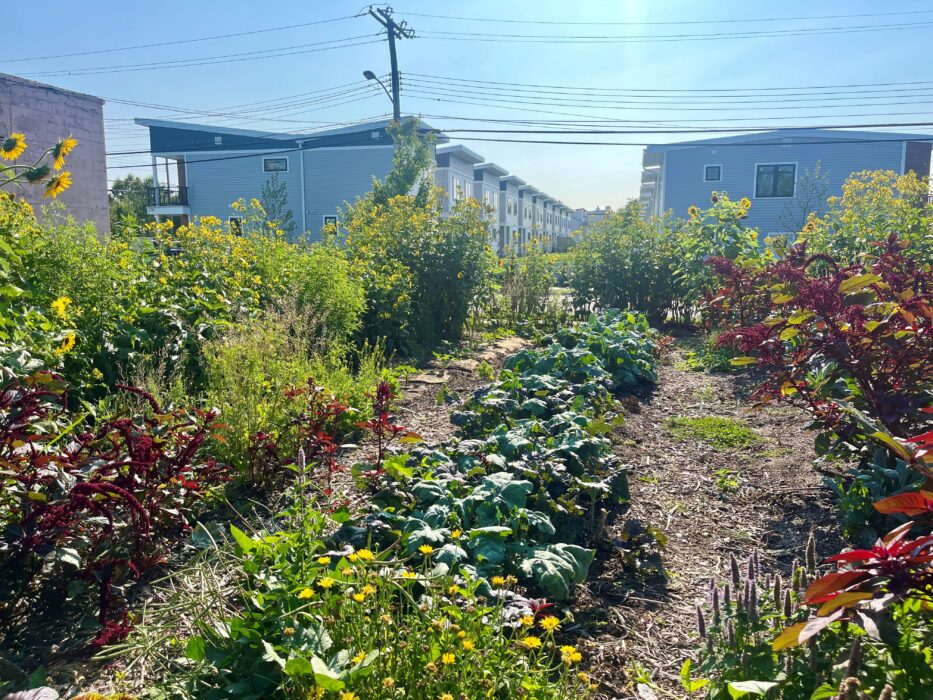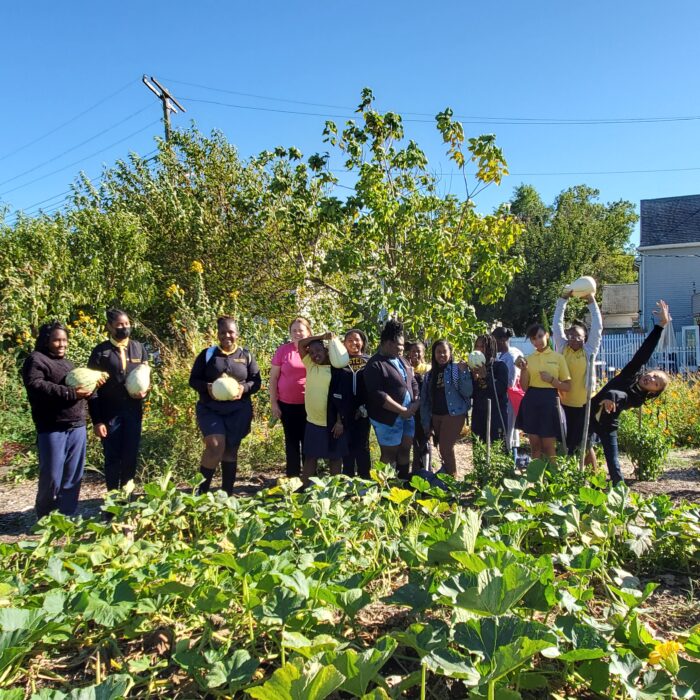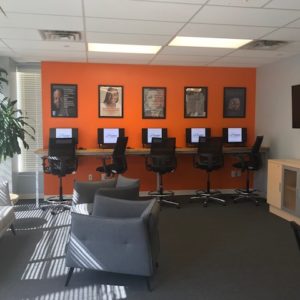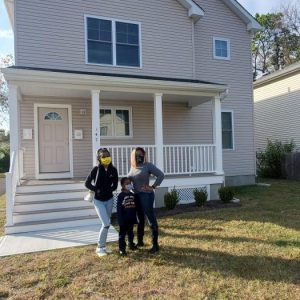Program Spotlight | Launch Center: Where the Path to Economic Success Starts | June 2024
The Launch Center is on a mission to assist individuals in launching their careers, businesses, and lives. Many people don’t know where to start when they find themselves in need of assistance, searching for a job, or setting goals to obtain a career. That’s where Interfaith Neighbors’ (IFN) Launch Center steps in. With a newly expanded space, the Launch Center is home to a Help Desk, community classroom, conference room, and meeting and office spaces. The Launch Center offers an array of services to individuals from the Monmouth County community, meeting them wherever they are on their journey to economic success.
The Help Desk is the starting point for most people visiting the Launch Center, whether they are seeking help accessing government services, such as SNAP benefits, Social Security or Veterans Assistance, or with connections to other agencies or Interfaith Neighbors programs. They may simply need to use a computer to fill out a job application or search for open positions in the area. Staff at the Help Desk can steer visitors in the right direction, which is often Launch Center life coaching, capacity building, business coaching, or the intensive career preparation course, SOAR.
SOAR is a ‘barrier-busting’ workforce training program that involves success skills training, certification program scholarships, and two years of success coaching. The combination of eliminating barriers, such as transportation and childcare costs, life coaching, and scholarships into fast-track professional certification programs ensures SOAR Colleagues’ success upon graduation. Popular career pathways include Business Office Support Specialists (BOSS), Commercial Driver’s License (CDL), Computer Service Technician, Automotive Technician, and Solar Installation with Commercial Roofing Certificate. The Launch Center maintains relationships with local employers in these fields that know and value SOAR training.
The Launch Center also offers the Young Masterminds program, which is like SOAR, but designed specifically for high school students. Young Masterminds helps prepare high schoolers for their transition after graduation. Now operating at Asbury Park, Neptune, and Academy Charter High Schools, this program helps numerous students learn more about themselves, their strengths, and how to utilize them to reach their potential once they graduate and pursue further education or enter the professional world.

Young Masterminds Kingston Pinnock (l) and Daaron Lynch (r), both freshman at Neptune High School with Semaj Vanzant, Launch Center Director of Relationship Management, who leads the program.
Capacity building coaching of small business owners and newly formed non-profits, and individual life coaching are Launch Center programs growing in demand. Staff members and Certified Life Coaches, Gillian Edgar and Semaj Vanzant, assist life coaching participants in defining goals and taking tangible steps to accomplish them. Business coaching aids local entrepreneurs in developing business plans or stabilizing and growing their business. Nonprofit organizations and community groups are also assisted through capacity building, working with Launch Center staff to develop fundraising tools, operating budgets, strategic plans, and event planning. The Prosper Foundation, a blossoming non-profit organization in Asbury Park focused on mental health services for youth, and the Cazzeek Brothers, an Asbury Park and Neptune non-profit organization facilitating youth mentoring and sports programs, are two of the Launch Center’s current capacity building clients. Through work with Launch Center staff, these non-profit organizations have been able to expand their work, increase their philanthropic revenue, and make lasting connections within the community.
Launch Center by the Numbers: 2023
250 Individuals Assisted at the Help Desk
300 Workshop Participants
20 SOAR Graduates
50 Life Coaching, Small Business Counseling and Non-Profit Capacity Building Clients
30 Young Masterminds Students
Program Spotlight | Meals on Wheels Monmouth County – Let’s Save Lunch! | March 2024
As we approach March, our seniors need us to “March for Meals” now, more than ever. Local Meals on Wheels branches across the nation are struggling to access adequate funding to continue delivering meals to seniors in need while undergoing challenges such as increased food costs and gas prices, labor shortages, and supply chain issues. With these issues being so prevalent, Meals on Wheels has started a new campaign, #SaveLunch, which calls on citizens to urge Congress to increase funding provided by the Older Americans Act, which supports Meals on Wheels programs across the country.![]()
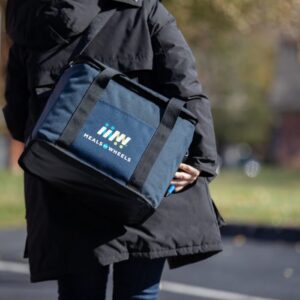 Meals on Wheels of America reports that 10 million senior citizens are threatened by or experience hunger. Food insecurity among older adults is disproportionately affecting people of color, with 17% of Black seniors and 14% of Hispanic seniors experiencing hunger compared to 6% of White seniors. One in four people in America are 60+ and this population is only getting larger, with 12,000 turning 60 each day. As the senior citizen population increases, seniors are living longer with less money. One in two seniors living alone lacks the income to pay for basic needs. Homebound seniors also struggle with isolation and loneliness in addition to food insecurity. One in three seniors lives alone and one in four seniors reports feeling lonely.
Meals on Wheels of America reports that 10 million senior citizens are threatened by or experience hunger. Food insecurity among older adults is disproportionately affecting people of color, with 17% of Black seniors and 14% of Hispanic seniors experiencing hunger compared to 6% of White seniors. One in four people in America are 60+ and this population is only getting larger, with 12,000 turning 60 each day. As the senior citizen population increases, seniors are living longer with less money. One in two seniors living alone lacks the income to pay for basic needs. Homebound seniors also struggle with isolation and loneliness in addition to food insecurity. One in three seniors lives alone and one in four seniors reports feeling lonely.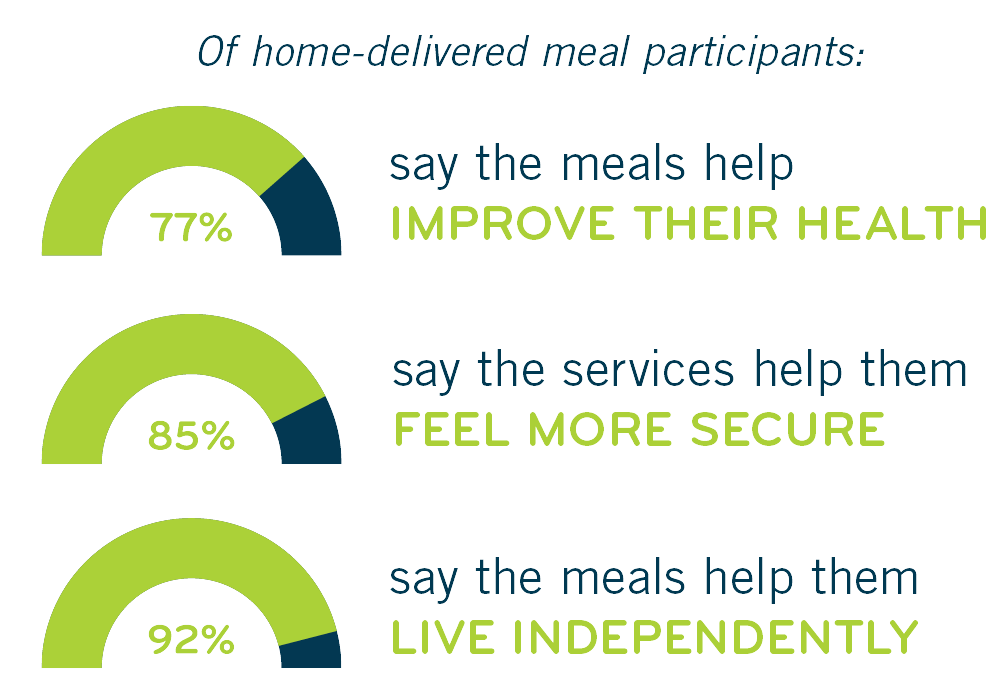
As these pressing issues of senior hunger and isolation grow, Meals on Wheels continues to be a beacon of light, bringing food security, nutrition, and a friendly face to seniors in need. Meals on Wheels of Monmouth County, operated by Interfaith Neighbors, serves over 1,100 meals daily to homebound seniors, disabled persons and seniors visiting their senior centers for meals.
Interfaith Neighbors serves approximately 3,500 seniors annually, amounting to over 350,000 meals delivered each year. And, Interfaith Neighbors ensures these meals are made with nutritious and quality ingredients to best serve Monmouth County senior citizens.
You can support Meals on Wheels of Monmouth County during this March for Meals campaign by donating to help continue services to seniors in need, volunteering filling bags with meals or delivering, spreading awareness about the issues of senior hunger and isolation, or by urging Congress to #SaveLunch for senior citizens. There are numerous ways to assist in ensuring seniors have stability and security through supporting Meals on Wheels.
Program Spotlight | Facing a Crisis: The Rental & Mortgage Assistance Program | December 2023
The shortage of affordable housing and families facing homelessness has been an issue in the U.S. and NJ since long before Interfaith Neighbors’ founding in 1988. However, today’s “housing crisis” has increasingly been affecting numerous people who never imagined they could be struggling.
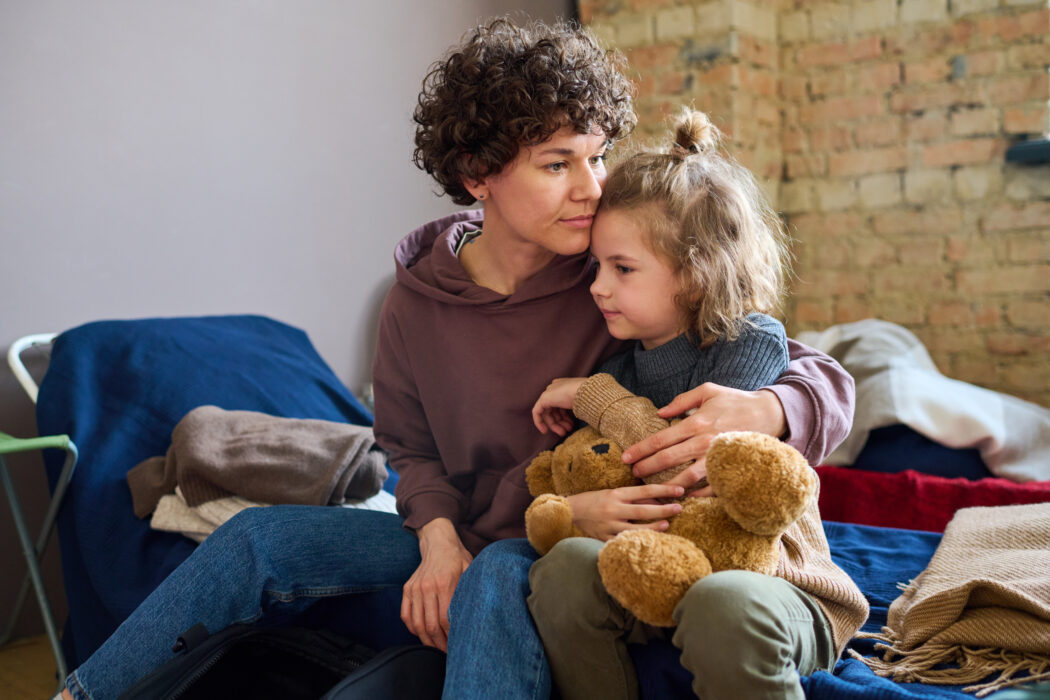 The U.S. Poverty Rate saw its largest one-year increase in history with 12.4% of Americans living in poverty in 2022, increasing from 7.4% in 2021. According to the 2023 State of the Nation’s Housing Report by Harvard University, 2022 was a record-breaking year for rising rent and home-ownership prices in the U.S., where annual home prices rose 20.1% and annual rent price growth reached 15.3%. 2.4 million more people were priced out of their homes in 2022 than in 2021, and the annual income to afford median home ownership rose 20% to $117,000 (JCHS). Here in New Jersey, the problem is exacerbated by the high cost of living. Here, housing costs are 31% higher than the national average. The United Way estimates that 37% of Monmouth County residents fall into the category of “working poor.” Not surprisingly, in conjunction with rising home and rent prices, the number of citizens experiencing unsheltered homelessness rose 3.4% since 2020, according to the US Department of Housing and Urban Development (HUD). Communities with a high concentration of people of color and high poverty rates, like Asbury Park, are disproportionately experiencing negative effects from this latest housing crisis.
The U.S. Poverty Rate saw its largest one-year increase in history with 12.4% of Americans living in poverty in 2022, increasing from 7.4% in 2021. According to the 2023 State of the Nation’s Housing Report by Harvard University, 2022 was a record-breaking year for rising rent and home-ownership prices in the U.S., where annual home prices rose 20.1% and annual rent price growth reached 15.3%. 2.4 million more people were priced out of their homes in 2022 than in 2021, and the annual income to afford median home ownership rose 20% to $117,000 (JCHS). Here in New Jersey, the problem is exacerbated by the high cost of living. Here, housing costs are 31% higher than the national average. The United Way estimates that 37% of Monmouth County residents fall into the category of “working poor.” Not surprisingly, in conjunction with rising home and rent prices, the number of citizens experiencing unsheltered homelessness rose 3.4% since 2020, according to the US Department of Housing and Urban Development (HUD). Communities with a high concentration of people of color and high poverty rates, like Asbury Park, are disproportionately experiencing negative effects from this latest housing crisis.
Interfaith Neighbors’ (IFN) Senior Manager of Homeless Prevention through Rental & Mortgage Assistance, Judy Nelan, expressed how great the need for rental and mortgage assistance currently is, especially in the low-income areas Interfaith Neighbors serves across Monmouth County.
“The phone just rings and rings all day long. We’re getting about 150 calls for mortgage and rental assistance per week, which is about double what we received last year at this time,” Judy explained. She went on to describe some of the program’s current challenges, stating, “most of the grants we receive to assist people who have fallen behind in their housing payments require rent to be affordable for the recipient going forward, and this is becoming harder to achieve due to the ever increasing rents in Monmouth County. We’re having to refer significantly more people to other agencies, and there have been numerous people returning for additional assistance who were previously helped with one or two months of rent.”
The Rental and Mortgage Assistance Program is funded primarily by Monmouth County, with SSH (Social Services for the Homeless) and SSH/TANF (SSH/Temporary Assistance for Needy Families) grant funds, as well as a grants from the State of NJ and private donations. In 2023, the Program received $281,448 in SSH and SSH TANF funding. During the COVID-19 pandemic, emergency rental assistance funding was also provided through the county and state to supplement the standard funding. IFN’s Program assisted 298 households with over $635,900 in 2022. From January 2023 to July 1st, 2023, the Rental and Mortgage Assistance Program assisted 174 households with $447,820. With this trend continuing, the program will assist significantly more households in 2023 than in 2022, due to the county’s additional COVID-related funding and increases in need for assistance. However, it is anticipated that 2023 will be the last year that COVID-related funding will be available.
With so many people facing evictions, foreclosures, and near homelessness, the work of IFN’s Rental & Mortgage Assistance Programs is as pertinent as ever. Many of the individuals and families inquiring about assistance with rent and mortgages never thought they would see the day they had to call for help. Interfaith Neighbors was founded on this work of preventing homelessness and will continue to provide those in need with the basic necessities of life, especially the needed assistance for people to remain in their homes and stave off homelessness.
Program Spotlight | Community Empowerment: Education & Food Justice | September 2023
Kula Urban Farm, a program of Interfaith Neighbors, has been empowering the Asbury Park community since its inception in 2015. With its hydroponic greenhouse, traditional raised beds, and Farm Without Borders, Kula Farm grows seasonal, sustainable produce that can be purchased by local restaurants and residents, while supplying free produce to the community and neighboring food pantry. However, the work to support the community with access to healthy food does not stop there. The Farm is also committed to providing education, experiences for the development of a healthy lifestyle, and an engaging community space for community members.
Kula’s dedication to food justice and access is exemplified through its partnership with Bethel AME Food Pantry. Produce is harvested and contributed weekly to this local food pantry, located on the lot adjacent to the Farm, and distributed to local families. Many West Side residents lack the funds and access to fresh, healthy produce and would suffer nutritionally without this initiative. Kula Farm also manages the Farm Without Borders located on Springwood and Atkins Avenues. The Farm Without Borders has transformed a vacant lot into an open community garden, where community members are welcome to harvest throughout the season. This not only makes for a more beautiful Asbury Park, but it also allows the community to be involved in the process of growing their own healthy food.
Kula Farm also facilitates a job program, designed to promote foundational workplace skills for members of the community. By offering a positive work experience to add to a resume, Kula Farm hopes to take away barriers to future employment. Working with your hands, performing tasks like planting and weeding, can also be extremely therapeutic. Those returning to the workface after a long hiatus or previous incarceration are welcome to restart their journey here— stop by to fill out an application!
Community engagement and education is facilitated through classes and workshops held at the Farm. Classes and workshops engage individuals of all ages on a variety of topics. Kula works with various schools to organize extracurricular programs and holds homeschool classes for children, teaching them about the environment and gardening, while providing hands-on activities. Some of the workshop topics for adults include composting, the cannabis industry, recycled art, kimchi making, nature printmaking, and more! It’s an amazing space to learn and express yourself while engaging with the community.
Interfaith Neighbors’ Meeting the Moment Campaign has secured funding for an exciting expansion of the Farm, that will add a three-season pavilion, a full kitchen, and bathrooms. Look for these new additions next spring! The expansion will allow the Farm to increase community outreach and events to reach even more people in the community. Kula Urban Farm will continue to provide the surrounding community with the tools, education, and space that empowers them to conquer food injustices and to flourish.
Program Spotlight | Community Food Connection | June 2023
The Community Food Connection, initiated by Interfaith Neighbors (IFN), has already made a lasting impact on food justice in the Asbury Park area and hopes to spread its influence by organizing more individuals, community groups, foundations, farms, and health-care systems to combat food insecurity together. The Community Food Connection is a community-led coalition that connects Asbury Park food pantries and other community spaces to share information and resources, to ultimately have an impact on eliminating nutritional insecurity and increasing food access. This coalition is an outgrowth of the Building Healthier, More Equitable Communities (BHEC) program, led by the Philadelphia-based Reinvestment Fund, and funded by the Robert Wood Johnson Foundation. Four cities, Asbury Park, Camden, Paterson, and Newark were selected to participate in the BHEC program in 2021, and IFN is 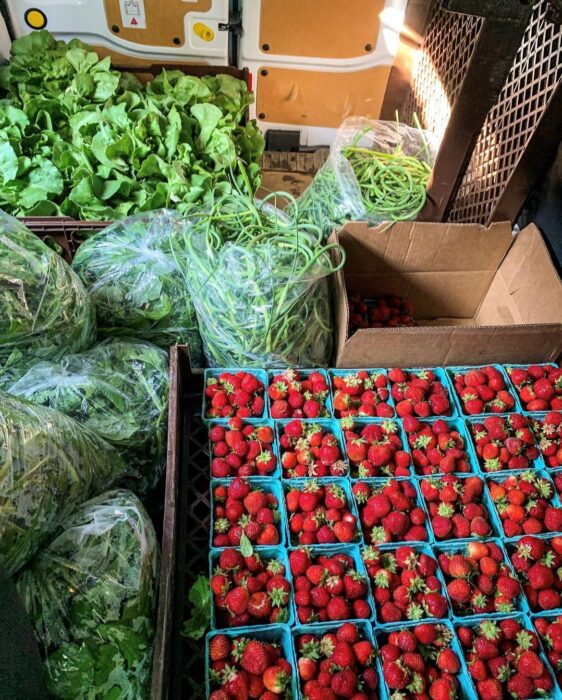 the designated lead agency for Asbury Park. IFN BHEC Coordinator, Karyn Moskowitz, has played an integral role in the coalition.
the designated lead agency for Asbury Park. IFN BHEC Coordinator, Karyn Moskowitz, has played an integral role in the coalition.
“Growing up in the Garden State, eating fresh produce from farm stands, I was veggie-obsessed from a young age,” Karyn said. She described her passion for food justice and her realization, while working in Louisville, Kentucky that numerous individuals lack access to consistent, affordable, healthy food.
“According to the NJ Economic Development Authority, Asbury Park is the 17th ranked food desert in severity in the state. And the number one cause of death in our country is heart disease. What we’re dying from is preventable, and we need to invest in creating access to fresh, healthy food to stop it,” Karyn stated.
Karyn’s knowledge and enthusiasm, combined with Interfaith Neighbors’ and BHEC’s mission and resources, has led to numerous initiatives in Asbury Park to combat these issues. Community Food Connection linked with NJ family owned Fernbrook Farms, that was passionate about their food being distributed to those lacking access to fresh produce. Last year, with funds from the BHEC Grant, Hackensack Meridian Health, and many individual donors, IFN purchased produce from Fernbrook Farms, supplying 200 families with fresh, local produce every week. This season, 400 families will be receiving this produce weekly from 17 food pantries in the Asbury Park area.
Another success for food justice in Asbury Park germinated by the Community Food Connection is a popular farmer’s market, Asbury Fresh Market, accepting NJ SNAP benefits for low-income families! The coalition is working to expand these conversations with other farmer’s markets.
“We’re focusing a lot more on workshops and demos this season, as many people who now have access to fresh, healthy food don’t exactly know how to prepare it. We’ve created veggie tip sheets and recipes, and plan on hosting cooking classes” explained Karyn.
In fact, this past May, Community Food Connection partnered with the Asbury Park Mayor’s Wellness Committee for “Stigma Free May.” This challenge explored the connection between behavioral health and nutrition, challenged citizens to adopt a plant-focused diet, and had numerous events with community partners. Some of these events included cooking demos, panel discussions, and guided meditations.
The coalition’s work does not stop at Asbury Park. Karyn is part of the Statewide Food Policy Council. Two recent workshops, in collaboration with Newark, focused on “Reimaging Local Food Systems” and “Food is Medicine.” Working with other cities to advocate for statewide policy change is important to the coalition, as well as the BHEC initiative.
As the Community Food Connection gears up for its second growing season, they can use all the help they can get! Visit the IFN website to find out more about how to get involved and volunteer. Fighting for food justice every day, the Community Food Connection keeps planting seeds and growing roots, so our food system can continue to improve.
Program Spotlight | The Power of a Knock | March 2023
A knock at the door might not seem like a big deal to many of us. But, to a homebound senior citizen, it could signal the arrival of the only person they might see all day, or all week long. It brings hope. It brings health. It brings the nutrition and care that will completely make their day. A knock from an Interfaith Neighbors Meals on Wheels representative means nourishment for the body and soul.
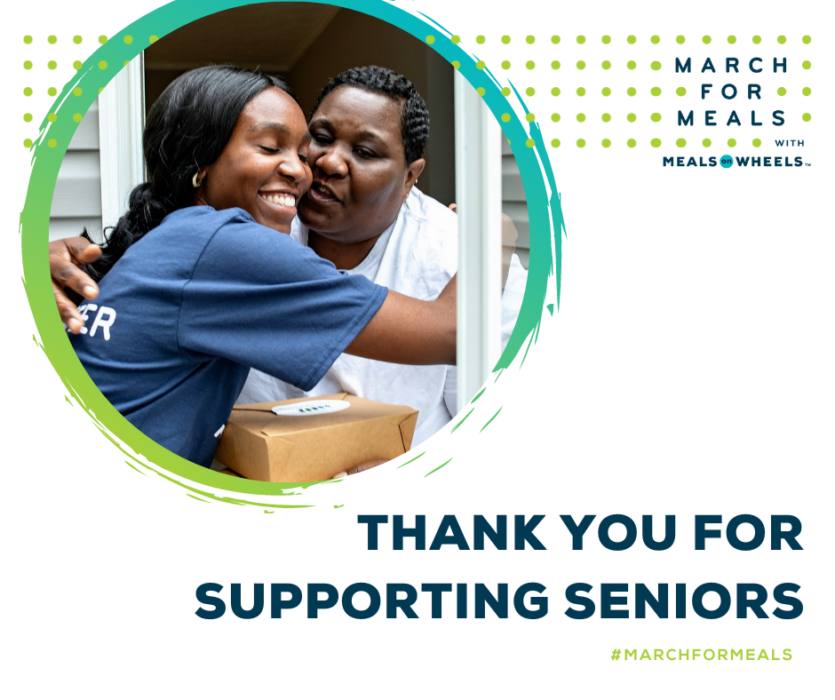 Every weekday Interfaith Neighbors’ employees and volunteers knock on doors and deliver meals to homebound seniors throughout Monmouth County. Many of these senior citizens would face food insecurity and/or malnutrition without our services. According to Meals on Wheels America, 7.2 million senior citizens are either food insecure or facing hunger in the US. There are layers of examples and stories behind these numbers, and Interfaith Neighbors aims to provide long-lasting positive effects on the seniors we serve through our Nutrition/ Meals on Wheels Program.
Every weekday Interfaith Neighbors’ employees and volunteers knock on doors and deliver meals to homebound seniors throughout Monmouth County. Many of these senior citizens would face food insecurity and/or malnutrition without our services. According to Meals on Wheels America, 7.2 million senior citizens are either food insecure or facing hunger in the US. There are layers of examples and stories behind these numbers, and Interfaith Neighbors aims to provide long-lasting positive effects on the seniors we serve through our Nutrition/ Meals on Wheels Program.
Interfaith Neighbors began operating the Monmouth County branch of Meals on Wheels in 1991. Our organization delivers over 1,100 meals every weekday. Powered by employees and hundreds of volunteers, we make sure these meals are delivered to the doorsteps of homebound seniors and six municipal congregate sites for seniors who need it most.
Senior populations are some of the most at-risk when it comes to food insecurity. About 33% of older adults admitted to the hospital may be malnourished and up to 50% of community-dwelling older adults may be malnourished (Meals on Wheels, 2020). The nation’s growing senior population, expected to double by 2050 to 112 million, will exacerbate this need. Meals on Wheels services are needed now more than ever.
COVID-19 has had lasting negative effects on senior hunger and malnutrition as well. According to Meals on Wheels America, the proportion of seniors 60 years and older who sometimes or often did not have enough to eat rose to 4.9% in 2020 from 2.8% in 2019, a 75% increase. Not only did seniors suffer more from hunger due to the pandemic, but they also reported higher rates of anxiety or depression.
Many of our Meals on Wheels recipients reported being extremely lonely during the pandemic, causing their mental well-being to decline. We continue to experience COVID spread in our communities resulting in our seniors continuing to feel isolated and fearful of exposure to the virus.
We fufill the need for social interaction and nutritious meals for homebound seniors. Frankly, our Meals on Wheels deliveries are much more than a meal, and numerous seniors have expressed how much our drivers’ friendly faces mean to them.
March marks a special time for the Meals on Wheels nationwide organization, March for Meals. The March for Meals Campaign shines a light on the need for funding to continue addressing growing isolation and hunger, through community-based programs such as the one IFN facilitates.
Approximately 350,000 meals are prepared and delivered annually by Interfaith Neighbors Meals on Wheels for seniors and disabled persons. We operate 75 routes covering the 665 square miles of Monmouth County, delivering hot lunches, and for many participants, their daily breakfast. Each day our kitchen team, drivers and up to 125 volunteers make our program work. No one is required to pay for their meals, but donations are appreciated from recipients who are able and from the broader community.
Program Spotlight | Home for the Holidays (Almost) | December 2022
Owning a home means stability, agency, and being part of a community to Carritta Cook. Carritta has recently contracted to purchase one of Interfaith Neighbors’ (IFN) Parkview AP homes. She and her son Jeremiah will be moving into the home Spring of 2023. Almost home for the holidays, and certainly looking forward to enjoying them in her new home come next year.
Parkview AP is an Interfaith Neighbors project, which will ultimately result in ten new homeowners on the West Side of Asbury Park. To date, six of the homes have been completed, sold and occupied. Two of these were purchased by qualified low- to moderate-income purchasers, and the other four, were purchased at market rate. Each property includes a three bedroom, two and a half bath home and a detached garage with a one-bedroom apartment above. The remaining four properties, all of which have contracted purchasers, are projected to be completed in the second quarter of 2023.
Originally from Trenton, Carritta came to Asbury Park because her godmother lived here, and she was hoping to find more affordable childcare for her son, Jeremiah.
“We haven’t turned back ever since. Once we settled into Asbury Park, I always said this would be our forever home” Carritta explained. Now employed at a local oral surgeon’s office and the President of the Asbury Park School Board, Carritta has certainly become ingrained in the Asbury Park community. She described that she feels more at home and part of this community than she ever did in the ones she grew up in.
“The back unit that I will be able to rent out is one of the greatest parts. Rental payments will provide me with supplemental income that will allow me to leave living paycheck-to-paycheck behind,” Carritta described when asked about her favorite features of the home. Once she becomes more financially stable, she hopes to keep the back apartment unit as an extension of her own home.
“Owning a home means financial freedom to me,” Carritta explained. It’s the little things, like taking a day off to go to her son’s school assembly, that being more financially stable will give her the agency to do.
Carritta went on to talk about the Pathway to Home Ownership Program Interfaith Neighbors offers and how IFN helped her purchase this home. Pathway to Home Ownership provides a first time home buyer credit counseling to be sure they are ready for the transition to homeownership. Participants sign a one-year lease on a three-bedroom apartment and pay a below-market-rate monthly rental fee. IFN escrows a portion of their monthly rental payments to contribute to the down payment on the purchase of a home. Carritta said she could not imagine accomplishing owning a home without this program.
“Helping me figure out the lender process was a huge help. They advised that I could go to multiple lenders if need-be without it hurting my credit. Interfaith suggested several lending options and one of them worked out great!” Carritta explained.
 When Carritta moves into her new home next spring, she is hoping to foster a child as well. Carritta has already started the process to become a licensed foster parent and has one last home study and an inspection to pass before obtaining her license. Another child who needs a home will be given a place in her Asbury Park haven.
When Carritta moves into her new home next spring, she is hoping to foster a child as well. Carritta has already started the process to become a licensed foster parent and has one last home study and an inspection to pass before obtaining her license. Another child who needs a home will be given a place in her Asbury Park haven.
“I’m excited I won’t always have to be on Jeremiah to be quiet when he’s playing because there will be no one living below us,” Carritta stated, chuckling a bit. Jeremiah is especially excited they can have their two cats live with them again, who have been staying at a friend’s house.
With so much to look forward to including stability, safety, and comfort, Carritta Cook and her family are grateful and excited to become new homeowners. Next year, she’ll have her first months of homeownership under her belt, and a place to call home for the holidays.
Program Spotlight | Celebrating 50 Years | March 2022
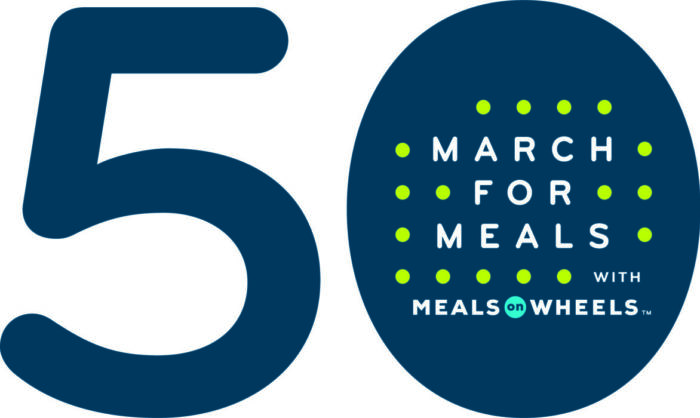 The annual March for Meals celebration commemorates the historic day in March of 1972 when President Nixon signed into law a measure that amended the Older Americans Act of 1965 to include a national nutrition program for seniors 60 years and older. This year, Meals on Wheels programs from across the country are joining forces for the awareness campaign to celebrate 50 years of success and garner the support needed to ensure these critical programs can continue to address food insecurity and malnutrition, combat social isolation, enable independence, and improve the health of seniors for years to come.
The annual March for Meals celebration commemorates the historic day in March of 1972 when President Nixon signed into law a measure that amended the Older Americans Act of 1965 to include a national nutrition program for seniors 60 years and older. This year, Meals on Wheels programs from across the country are joining forces for the awareness campaign to celebrate 50 years of success and garner the support needed to ensure these critical programs can continue to address food insecurity and malnutrition, combat social isolation, enable independence, and improve the health of seniors for years to come.
Interfaith Neighbors began operating the Monmouth County Meals on Wheels program thirty-one years ago in 1991. Every weekday, we prepare and deliver over 1,100 meals throughout Monmouth County, through the efforts of over 125 volunteers and Interfaith Neighbors’ staff, to seniors at home and municipal congregate sites across the county.
Unfortunately, the COVID-19 pandemic is still impacting everyone after two years, but the pandemic has highlighted just how important the Meals on Wheels program is for home bound senior citizens.
Many older adults struggled with hunger and isolation before the corona virus pandemic. These past two years have exacerbated these issues and increased the need for services like Meals on Wheels. Reporting from Meals on Wheels America shows an increase of seniors, aged 60 and older, have reported that sometimes or often they didn’t have enough to eat from 2.8% pre-pandemic to 4.9% in 2020 – a 75% increase.
Here in New Jersey, eighteen percent of senior citizens are food insecure, meaning they are at-risk for hunger. Additionally, twenty-six percent of NJ seniors have a disability. The daily home visits of the Meals on Wheels program provide opportunities to not just meet nutritional needs, but also combat social isolation, address safety hazards, and provide a daily check in.
Nationwide, one in four senior citizens live alone, and one in four report they feel lonely. Often, the Meals on Wheels volunteer is the only person the homebound seniors see on a given day. For a home-bound senior citizen, these daily meal deliveries and check-ins are often what allows them to stay in their homes and continue to live independently. Staying in one’s own home can make a huge difference both to one’s quality of life and financial resources.
Approximately 350,000 meals are prepared and delivered annually by Interfaith Neighbors Meals on Wheels for seniors and disabled persons. We operate 75 routes covering the 665 square miles of Monmouth County, delivering hot lunches, and for many participants, their daily breakfast. Each day our kitchen team, drivers and up to 125 volunteers make our program work. No one is required to pay for their meals, but donations are appreciated from recipients who are able and from the broader community.
Program Spotlight | We Have Lift Off | November 2021
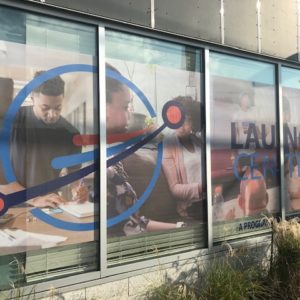 On September 13, 2021, Interfaith Neighbors officially opened the Launch Center in the Springwood Center adjacent to MacroBites at the Kula Cafe and the IFN Business Development Center. The Launch Center’s tag line is “Launch your career – Launch your business – Launch your life,” and it represents the evolution of Interfaith Neighbors’ economic and workforce development programming. Moving into the new space also marks the launching of new programs and services that are available to the community, grouping programs and services in a way that allows Interfaith Neighbors to meet people who come to the Launch Center where they are personally in their life.
On September 13, 2021, Interfaith Neighbors officially opened the Launch Center in the Springwood Center adjacent to MacroBites at the Kula Cafe and the IFN Business Development Center. The Launch Center’s tag line is “Launch your career – Launch your business – Launch your life,” and it represents the evolution of Interfaith Neighbors’ economic and workforce development programming. Moving into the new space also marks the launching of new programs and services that are available to the community, grouping programs and services in a way that allows Interfaith Neighbors to meet people who come to the Launch Center where they are personally in their life.
The new space, complete with a computer lab available to the public, help desk, classroom, multiple small group meeting areas and private offices for confidential coaching sessions, offers a welcoming and accessible environment from which we can offer our full spectrum of personal, career and business development programs and services to the local community.
The Launch Center now offers Personalized Advancement Services. At the Help Desk, anyone in the community with a problem can find assistance in determining the solution. Mission Control Life Coaching is designed for individuals who are ready to take action in moving towards their deams and would benefit from guidance and support along the way. Business Development Center Coaching is for local businesses and new entrepreneurs who would benefit from personalized mentoring to launch, grow or stablize their business.
IFN’s Career Preparation Programs have been updated and include three different entry points. Lift Off Work Experience is for adults of all ages who have been disengaged from the workforce due to incarceration, addiction, homelessness, illness, etc. It provides short-term entry level employment to ease in the transition back to work and provides an employer reference in their future employment search. The Level Up Work Experience Program is designed for adults who are driven towards entry into industries in which hands on work experience outweighs academic training. This program, which replaces the Kula Cafe Hospitality Training Program, partners with area local businesses as job placement sites for participants in the program.
The SOAR program continues to be IFN’s signature career preparation program. It is the pathway for those individuals who have demonstrated their ability to maintain a job and are ready to soar into a career. This program includes intensive career specific, non-college, educational certification training and long-term mentoring and coaching.
Focusing on the broader community, the Center also offers a new service, the Launch Pad Learning Lab. The Learning Lab offers a regular schedule of workshops for community residents with a desire to enrich their lives. Workshops are offered on topics including financial wellness, conflict resolution, professional communications, computer literacy, interview skills and more.
The Launch Center is also working with local businesses to host a Jobs Board of available positions in the local job market along with a Virtual Resource Center for business owners to access tools and resources to augment their businesses.
To learn more, stop by the Launch Center located at 1201 Springwood Avenue, Asbury Park, visit interfaithneighbors.org/launch-center or call 732-455-0519.
Program Spotlight | Kula Urban Farm | June 2021
At the Kula Urban Farm operations continued throughout the COVID-19 pandemic. While some programming had to pause, the greenhouse and garden beds continued to produce fresh produce throughout.
During the pandemic, most of the produce grown at the farm was donated to the Asbury Park Dinner Table project, which provided free meals for local families who were struggling to purchase food due to pandemic related job loss.
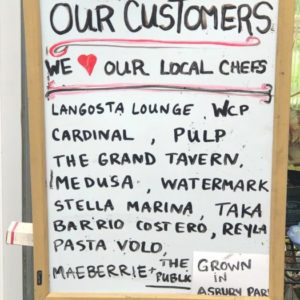 The Kula Farm operates as a social enterprise, relying on the sale of produce to fund its produce donations and its workforce development programs. As the pandemic began and area restaurants were forced to close, the farm temporarily lost many of its regular restaurant customers. However, the Farm team quickly got to work on an online marketplace and began to sell produce to the general public, creating a whole new base of customers for the farm as society and our restaurant partners return to normal.
The Kula Farm operates as a social enterprise, relying on the sale of produce to fund its produce donations and its workforce development programs. As the pandemic began and area restaurants were forced to close, the farm temporarily lost many of its regular restaurant customers. However, the Farm team quickly got to work on an online marketplace and began to sell produce to the general public, creating a whole new base of customers for the farm as society and our restaurant partners return to normal.
Another impact of the pandemic was a temporary halting of our Kula Farm Experience jobs program. Due to safety protocols, opportunities for non-essential workers at the Farm were limited. However, we were able to keep a core team of six working to ensure the greenhouse and beds continued to thrive. Matthais Van Oosterhout and Lisa Bagwell manage the farm. Ewelina Makowska is the assistant greenhouse manager. And, rounding out the team is Charles Ade, Chuck Thomas, and Nico Durant. This summer we are finally able to welcome back additional seasonal workers and volunteers.
The Farm continues to cultivate the “Turf” Farm Without Borders site at the intersection of Springwood and Atkins Avenues along with the undeveloped lot located between the Kula Farm and the Bethel AME pantry on Atkins Avenue. This spring, a third Farm Without Borders site was established on city-owned land located at the intersection of Springwood Avenue and Avenue A.
“The impact of the Farm on the community is often measured in pounds of produce or hours of work, but I believe the true influence lies in the physical change of a once empty lot into a dynamic growing space. Urban farms provide a place where people can connect with their food culture as well as nature. They can have a very real impact on our mental health, maybe by just offering the space to appreciate the beauty of a sunflower,” says Lisa Bagwell, farm manager.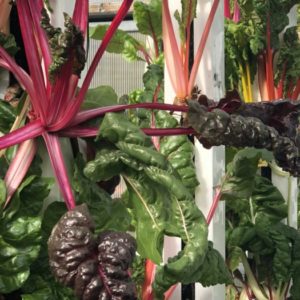
The Kula Urban Farm produces approximately 6,000 pounds of fresh produce annually, donating up to 4,000 pounds to community members, food pantries and meal programs.
As the pandemic eases, workshops have resumed at the Kula Farm. Farm to Table Dinners are also scheduled to resume later this summer. You can sign up for the Farm newsletter or inquire about booking a Farm to Table Dinner by emailing [email protected]. If you have a knowledge of gardening and are interested in volunteering at the farm, please contact Lisa Bagwell, Farm Manager at [email protected].
Program Spotlight | Pathway to Homeownership | December 2020
Asbury Park resident Carritta Cook, 32, has dreamt of becoming a homeowner ever since her 6-year-old son Jeremiah was born.
“I want a ‘forever home,’ somewhere he can grow up,” she said. “I want him to have the stability of knowing he will always have a home to come to.”
Her dream is on its way to becoming a reality due to Interfaith Neighbor’s (IFN) Pathway to Home Ownership (Pathway) program, which offers an affordable three-bedroom, two bath rental, while she prepares for purchasing a home. A percentage of Cook’s monthly rent will be placed in escrow by IFN, to be used towards her down payment, IFN’s Director of Real Estate Development Patrick Durkin said.
IFN recently completed construction of a new Pathway home on Borden Avenue. The home features two 3-bedroom apartments. Tenants generally occupy the home for a year to eighteen months to save for their downpayment, improve their credit, secure mortgage pre-approvals and find a suitable home for purchase.
Cook moved to Asbury Park from Union County after being ‘sold’ on the area and the local school district during visits to her godmother’s home. She is a single mother who is also fostering 18-year-old I’jhanae Silas, an Asbury Park High School senior, while balancing work at an oral surgeon’s office and the pursuit of a college degree.
Prior to participation in the program, Cook lived in a costlier apartment complex that offered little privacy and less square footage. She was astounded by how much IFN’s program offers – a way to accumulate a down payment, affordable rent, and pleasant and safe living conditions.
“This is more than I envisioned,” said Silas, who dreams of becoming a pediatrician. “This is the first time I will have my very own room.”
Cook loves the Asbury Park community and has IFN’s Parkview AP in mind or similar two-family home to purchase with a friend. She expressed gratitude for the opportunity to create a forever home for her son and Silas through the Pathway to Home Ownership program.
Support Our Efforts
Your financial donations allow us to continue to provide lifechanging services for the less fortunate of our community.
Click Here To Donate